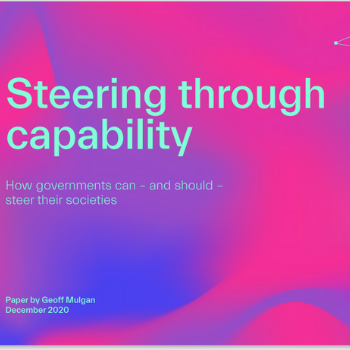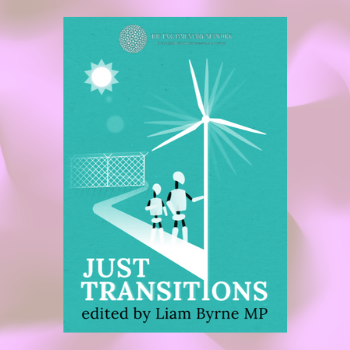The global COVID-19 pandemic has shone a bright light on the role of government in our societies. To guide us through the murky waters of the crisis and to lift us above it, our eyes and expectations have turned towards governments for leadership and specific measures, ranging from hard regulation to soft guidance and economic stimulus programmes.
Such a proactive role of governments hasn’t always been the case during the past decades. Rather, emphasis has been placed on enabling – creating the prerequisites for societies to function to the best of their ability. While this premise makes sense especially in times of relative stability, it becomes more challenging in times of crisis or when significant global and societal transformations are called for. In the 21st century, faced with the climate crisis and grand challenges from aging populations to global inequality, it seems that such a time of transformations is indeed upon us – a call for governments to not merely enable, but to take a proactive approach and responsibility for the direction we are headed. This means not only transformational politics, but increased capabilities of governance to deliver this transformation.
On this page, we collect timely contributions regarding how governments could and should interact with – and steer – societies.
There is a long tradition of understanding the impact governments have on societies, from specific taxation schemes to building public R&D investment programmes. There are many different wordings on this. Some call it steering, some governance. Others have a perspective of policy-making. To highlight the proactive stance governments should take in guiding our societies through this century of transformations, here we use steering – well aware that the steering of today and the future needs to be different from the steering of the last century.
Nevertheless, regardless of the word one uses, the core question is the same: How should governments design policies, regulate and guide in order for societies to achieve success in the 21st century?
Governing of the past will not be the same as governing of the future. This is why we want to initiate a dialogue regarding what is the meaningful role of governance in guiding our societies. Below we have gathered some of the most promising ideas, approaches and practices that are emerging for governments to take a proactive role in the transformations our societies are facing. Together, proactively, we encourage you to join in on the conversation and in bringing these ideas into reality.
Steering through capability
Demos Helsinki fellow, UCL professor and former Chief Executive of Nesta Geoff Mulgan shows explains governments should steer and how they can show the way for our societies to overcome the transformational challenges that they are facing in the current century
Humble approach to policy-making
The review ’Humble Government’ describes how a humble approach to policy-making can help us achieve long-term solutions to societal challenges.
21st Century Politics Require Governance Capable of Driving Transformation
Today, policy-makers wrestle with tough questions regarding climate change, technology, trade wars, and life after the pandemic. The road ahead is hard, but there is hope.
Want to join in on the conversation by sharing your thoughts on this page? Or are you ready to bring these ideas into reality through a shared project?






